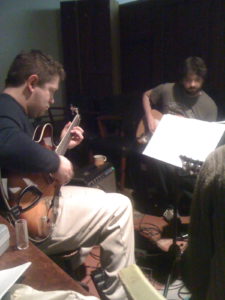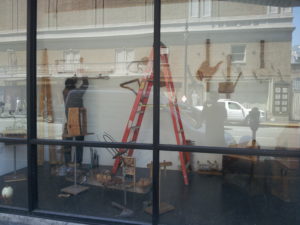The phrase “radical collaboration” has been more frequently used in projects aiming to protect nature and its scarce resources. At the Center for New Music, what we’re proposing is protection for a different kind of endangered species: the creative musician.

I’ve been heartened to see that we’re not the only ones interested in deeper sharing, collectivizing, community support, and all of the other ways in which “working together to help each other” can be described. In New York, spaces like The Stone (artistic director John Zorn) and Lainie Fefferman’s Exapno (Brooklyn) have carved out both space and method to give musicians things they need: affordable space and time to create and show their work. In Chicago, the ensemble Eighth Blackbird recently announced a joint venture with a puppeteer and a dance company to help build their organizations.
Here in San Francisco, I’ve felt a strong need for all of the things these other projects offer: collaborative workspace, affordable rehearsal space, a small performance space for new music, and a platform for administrative support and collaboration.
About two years ago, I posed a simple question to my friend and fellow composer Brent Miller: What would we do if we had a space that was all about new music? We started asking other musicians and music presenters the same question. In the fall of 2012, the Center for New Music was born.

As a new non-profit with a street-level space and mighty-big windows, we’re asked almost daily, “so what is this place?” We usually talk about the daytime co-working, the rehearsal studio that’ll soon be built out, evening performances, and member workshops. We talk about the incredible display in the window of experimental musical instruments. We talk about being musicians and composers ourselves, about learning, and about sharing lives in music.
What I hope we convey, though, is that we are offering a space for radical collaboration. Why should there be barriers between organizations and individuals? Shouldn’t it be easy for a young performer to meet and learn from a more established one? How else can we possibly learn from each other? This is why our mission statement uses the words “efficiency,” “integration,” and “community.” Yes, what we do in here is about music, but our purpose does not stop there. Our purpose is to build and improve the system that makes the music possible.
The programs we’re implementing are intended to bring in a spectrum of users: we have curated concerts, but anyone can join as an individual member and put on a show. There are private offices for established organizations, but there’s also co-working options for part-timers, and drop-in benefits if you just need to have a meeting or work for a few hours near a bunch of other musicians and producers.
Over time I believe the ethos behind all of this will become more apparent. Our theory is that all of this sharing and collaboration will build a stronger and more inviting new music community, a stronger new music scene, and ultimately more opportunities for everyone.
If you want to participate, know that we are in the habit of saying “yes.” This is a community-oriented project, and it would most benefit from any or all of your support, your artistry, your time and expertise, and maybe some of your stuff. We have faith that by banding together, our resources won’t seem so scarce, and a life full of creative music will be a vision that’s within reach.